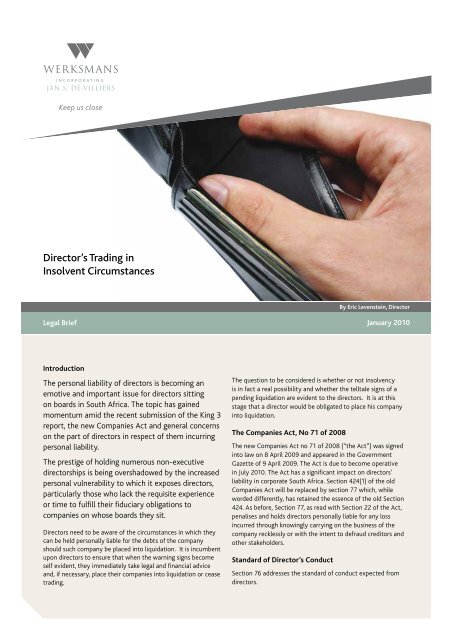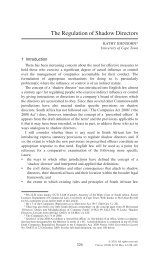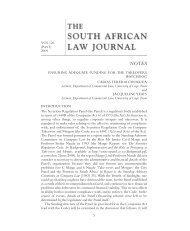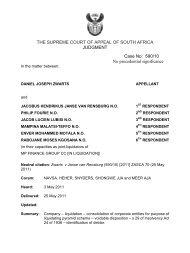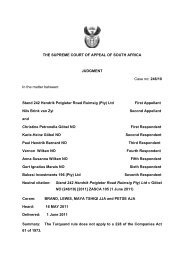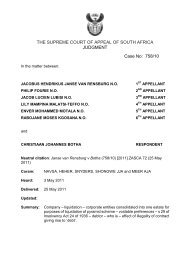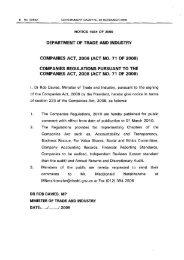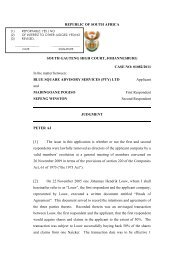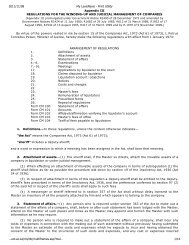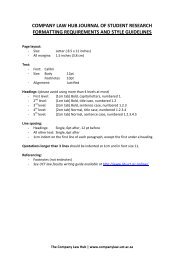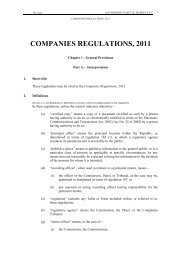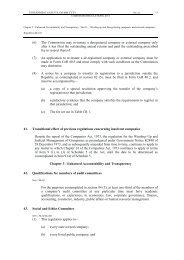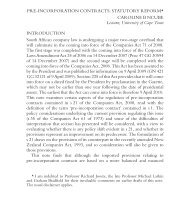Director's Trading in Insolvent Circumstances - Company Law Hub
Director's Trading in Insolvent Circumstances - Company Law Hub
Director's Trading in Insolvent Circumstances - Company Law Hub
Create successful ePaper yourself
Turn your PDF publications into a flip-book with our unique Google optimized e-Paper software.
Director’s <strong>Trad<strong>in</strong>g</strong> <strong>in</strong><br />
<strong>Insolvent</strong> <strong>Circumstances</strong><br />
By Eric Levenste<strong>in</strong>, Director<br />
Legal Brief<br />
January 2010<br />
Introduction<br />
The personal liability of directors is becom<strong>in</strong>g an<br />
emotive and important issue for directors sitt<strong>in</strong>g<br />
on boards <strong>in</strong> South Africa. The topic has ga<strong>in</strong>ed<br />
momentum amid the recent submission of the K<strong>in</strong>g 3<br />
report, the new Companies Act and general concerns<br />
on the part of directors <strong>in</strong> respect of them <strong>in</strong>curr<strong>in</strong>g<br />
personal liability.<br />
The prestige of hold<strong>in</strong>g numerous non-executive<br />
directorships is be<strong>in</strong>g overshadowed by the <strong>in</strong>creased<br />
personal vulnerability to which it exposes directors,<br />
particularly those who lack the requisite experience<br />
or time to fulfill their fiduciary obligations to<br />
companies on whose boards they sit.<br />
Directors need to be aware of the circumstances <strong>in</strong> which they<br />
can be held personally liable for the debts of the company<br />
should such company be placed <strong>in</strong>to liquidation. It is <strong>in</strong>cumbent<br />
upon directors to ensure that when the warn<strong>in</strong>g signs become<br />
self evident, they immediately take legal and f<strong>in</strong>ancial advice<br />
and, if necessary, place their companies <strong>in</strong>to liquidation or cease<br />
trad<strong>in</strong>g.<br />
The question to be considered is whether or not <strong>in</strong>solvency<br />
is <strong>in</strong> fact a real possibility and whether the telltale signs of a<br />
pend<strong>in</strong>g liquidation are evident to the directors. It is at this<br />
stage that a director would be obligated to place his company<br />
<strong>in</strong>to liquidation.<br />
The Companies Act, No 71 of 2008<br />
The new Companies Act no 71 of 2008 (“the Act”) was signed<br />
<strong>in</strong>to law on 8 April 2009 and appeared <strong>in</strong> the Government<br />
Gazette of 9 April 2009. The Act is due to become operative<br />
<strong>in</strong> July 2010. The Act has a significant impact on directors’<br />
liability <strong>in</strong> corporate South Africa. Section 424(1) of the old<br />
Companies Act will be replaced by section 77 which, while<br />
worded differently, has reta<strong>in</strong>ed the essence of the old Section<br />
424. As before, Section 77, as read with Section 22 of the Act,<br />
penalises and holds directors personally liable for any loss<br />
<strong>in</strong>curred through know<strong>in</strong>gly carry<strong>in</strong>g on the bus<strong>in</strong>ess of the<br />
company recklessly or with the <strong>in</strong>tent to defraud creditors and<br />
other stakeholders.<br />
Standard of Director’s Conduct<br />
Section 76 addresses the standard of conduct expected from<br />
directors.
Section 76(3) states that a director of a company, when act<strong>in</strong>g<br />
<strong>in</strong> that capacity, must exercise the powers and perform the<br />
functions of a director –<br />
a) <strong>in</strong> good faith and for a proper purpose;<br />
b) <strong>in</strong> the best <strong>in</strong>terests of the company; and<br />
c) with the degree of care, skill and diligence that may<br />
reasonably be expected of a person –<br />
i) carry<strong>in</strong>g out the same functions <strong>in</strong> relation to the<br />
company as those carried out by that director; and<br />
ii)<br />
hav<strong>in</strong>g the general knowledge, skill and experience of<br />
that director.<br />
Section 76(4) states that <strong>in</strong> respect of any particular matter<br />
aris<strong>in</strong>g <strong>in</strong> the exercise of the powers or the performance of the<br />
functions of a director, a particular director of a company will<br />
have satisfied the obligations set out <strong>in</strong> Section 76(3), if the<br />
director has taken reasonably diligent steps to become <strong>in</strong>formed<br />
about the matter.<br />
What would constitute “reasonable diligent steps?” In these<br />
circumstances, a director would be entitled to rely on the<br />
performance and <strong>in</strong>formation provided by persons who have<br />
received delegated powers or authority to perform one or<br />
more of the board’s functions that are capable of delegation<br />
under applicable law. This <strong>in</strong>cludes reliance by the director on<br />
the veracity of the <strong>in</strong>formation provided to such directors. This<br />
would also <strong>in</strong>clude f<strong>in</strong>ancial statements and other f<strong>in</strong>ancial<br />
data prepared by the employees of the company, accountants<br />
or any other professional person reta<strong>in</strong>ed by the company, the<br />
board or any committee constituted by the company. Also<br />
<strong>in</strong>cluded would be matters <strong>in</strong>volv<strong>in</strong>g skills or expertise that the<br />
directors reasonably believe are with<strong>in</strong> the particular person’s<br />
professional expert competence or as to which the particular<br />
person merits confidence. For <strong>in</strong>stance, if a director receives<br />
f<strong>in</strong>ancial <strong>in</strong>formation from departmental managers, he would<br />
be entitled to rely on the veracity of such <strong>in</strong>formation provided<br />
such reliance is “reasonable” <strong>in</strong> the circumstances and when<br />
one considers the specific expertise of that particular director.<br />
For example, the market<strong>in</strong>g director would not have the same<br />
level of <strong>in</strong>sight <strong>in</strong>to a set of management accounts as would the<br />
f<strong>in</strong>ancial director.<br />
Furthermore, <strong>in</strong> terms of Section 76(4) of the Act, a director<br />
would have satisfied the obligations of Section 76(3), if the<br />
director made a decision, or supported the decision of a<br />
committee or the board, with regard to that matter, and the<br />
director had a rational basis for believ<strong>in</strong>g, and did believe, that<br />
the decision was <strong>in</strong> the best <strong>in</strong>terests of the company.<br />
In terms of Section 77(2)(a), a director of a company may be<br />
held liable <strong>in</strong> accordance with the pr<strong>in</strong>ciples of the common law<br />
relat<strong>in</strong>g to the breach of a fiduciary duty, for any loss, damages<br />
or costs susta<strong>in</strong>ed by the company as a consequence of any<br />
breach by the director of duties contemplated, <strong>in</strong>ter alia, <strong>in</strong><br />
Section 76.<br />
Reckless <strong>Trad<strong>in</strong>g</strong>...When Does One W<strong>in</strong>d Up the<br />
<strong>Company</strong> When <strong>Trad<strong>in</strong>g</strong> <strong>in</strong> <strong>Insolvent</strong> <strong>Circumstances</strong>?<br />
Reckless trad<strong>in</strong>g, conduct<strong>in</strong>g the company’s bus<strong>in</strong>ess <strong>in</strong><br />
<strong>in</strong>solvent circumstances or with the <strong>in</strong>tention of defraud<strong>in</strong>g a<br />
creditor are also covered by the new Act. Section 77(3)(b) states<br />
that any director of a company is liable for any loss, damages<br />
or costs susta<strong>in</strong>ed by the company as a direct or <strong>in</strong>direct<br />
consequence of the director hav<strong>in</strong>g acquiesced <strong>in</strong> the carry<strong>in</strong>g<br />
on of the company’s bus<strong>in</strong>ess despite know<strong>in</strong>g that it was be<strong>in</strong>g<br />
conducted <strong>in</strong> a manner prohibited by Section 22(1) of the Act or<br />
has been a party to an act or omission by the company despite<br />
know<strong>in</strong>g that the act or omission was calculated to defraud a<br />
creditor, employee or shareholder of the company or had another<br />
fraudulent purpose.<br />
Section 22(1) states that a company must not carry on its<br />
bus<strong>in</strong>ess recklessly, with gross negligence, with <strong>in</strong>tent to defraud<br />
any person or for any fraudulent purpose; or trade under<br />
<strong>in</strong>solvent circumstances.<br />
In South African <strong>Law</strong>, a director would have a duty to apply for a<br />
company’s w<strong>in</strong>d<strong>in</strong>g up/liquidation (“liquidation”) as soon as he/<br />
she is know<strong>in</strong>gly aware that the company is trad<strong>in</strong>g <strong>in</strong> <strong>in</strong>solvent<br />
circumstances (both factually <strong>in</strong> that its liabilities exceed its<br />
assets, or commercially <strong>in</strong> that the company cannot pay its<br />
debts to creditors as and when they fall due). Consequently, if<br />
a company is trad<strong>in</strong>g <strong>in</strong> <strong>in</strong>solvent circumstances, the directors<br />
of the company would be obligated to file for the company’s<br />
liquidation on an urgent basis. For <strong>in</strong>stance, if a company<br />
cont<strong>in</strong>ues to <strong>in</strong>cur debts, where, <strong>in</strong> the op<strong>in</strong>ion of reasonable<br />
bus<strong>in</strong>essmen stand<strong>in</strong>g <strong>in</strong> the shoes of the directors, there<br />
would be no reasonable prospect of the creditors receiv<strong>in</strong>g<br />
payment when due, it will <strong>in</strong> general be a proper <strong>in</strong>ference that<br />
the bus<strong>in</strong>ess of the company is be<strong>in</strong>g carried on recklessly or<br />
negligently as contemplated by Section 22(1) of the Act.<br />
The tim<strong>in</strong>g of such a liquidation fil<strong>in</strong>g depends on the factual<br />
circumstances of each case and <strong>in</strong> particular the extent of the<br />
f<strong>in</strong>ancial <strong>in</strong>formation available to such director at the relevant<br />
time, but should a director not proceed <strong>in</strong> this manner he/she<br />
might be held personally liable <strong>in</strong> terms of Section 77(3)(b) as<br />
read with Section 22(1) of the Act.<br />
The test will always be that there will come a po<strong>in</strong>t <strong>in</strong> time when<br />
reasonable bus<strong>in</strong>essmen would w<strong>in</strong>d up their company and pay<br />
creditors <strong>in</strong> full, unless they have access to further capital which<br />
can revitalise their company with some appropriate form of<br />
capital reconstruction.<br />
The <strong>in</strong>curr<strong>in</strong>g of credit at a time where directors know that the<br />
company will not be able to meet its liabilities when they fall due<br />
will be tested by the court <strong>in</strong> order to substantiate that a director<br />
should have placed the company <strong>in</strong>to liquidation at that time<br />
and not cont<strong>in</strong>ued to do bus<strong>in</strong>ess know<strong>in</strong>g full well that such<br />
company would never be able to satisfy its creditors.<br />
The detail of f<strong>in</strong>ancial <strong>in</strong>formation available to a director,<br />
together with the veracity of such <strong>in</strong>formation, will be taken<br />
<strong>in</strong>to account when the personal liability of such director is<br />
exam<strong>in</strong>ed <strong>in</strong> terms of section 77 of the Act. Obviously if a<br />
director is <strong>in</strong> charge of operations, he will not be expected to be<br />
privy to the same level of f<strong>in</strong>ancial <strong>in</strong>formation as the f<strong>in</strong>ancial<br />
director.<br />
Defences Available to Directors<br />
The Act does make provision for directors to raise “honest or<br />
reasonable” behaviour on their part to be a defence <strong>in</strong> these<br />
circumstances. Section 77(9) states that <strong>in</strong> any proceed<strong>in</strong>gs<br />
aga<strong>in</strong>st a director, other than for willful misconduct or willful<br />
breach of trust, the court may relieve the director, either wholly<br />
or <strong>in</strong> part, from any liability set out <strong>in</strong> this section, or on any<br />
terms the court considers just, if it appears to the court that the<br />
director has acted honestly and reasonably, or hav<strong>in</strong>g regard to<br />
all the circumstances of the case, <strong>in</strong>clud<strong>in</strong>g those connected with<br />
the appo<strong>in</strong>tment of the director, it would be fair to excuse the<br />
director.
It is important to note that the Act does not limit the<br />
application of Section 77 only to directors as such. It would<br />
apply to a director, an alternate director, a prescribed officer<br />
(as designated by the M<strong>in</strong>ister), a person who is a member of a<br />
committee of a board of a company, or of the audit committee<br />
of a company irrespective of whether or not the person is also a<br />
member of the company’s board.<br />
Know<strong>in</strong>gly a Party to Prohibited Conduct?<br />
Furthermore the Act def<strong>in</strong>es what is meant by a person<br />
“know<strong>in</strong>g” of such prohibited conduct.<br />
“Know<strong>in</strong>g” is def<strong>in</strong>ed as a person either hav<strong>in</strong>g actual<br />
knowledge, a person who has <strong>in</strong>vestigated the matter to<br />
an extent that would have provided the person with actual<br />
knowledge; or a person who has taken other measures which,<br />
if taken, would reasonably be expected to have provided the<br />
person with actual knowledge of the matter.<br />
The <strong>in</strong>tended effect of Sections 76 and 77 <strong>in</strong> the Act is to<br />
protect directors who, <strong>in</strong> carry<strong>in</strong>g on the bus<strong>in</strong>ess of the<br />
company, have shown a genu<strong>in</strong>e concern for the prosperity<br />
of the company and whose decisions have been made <strong>in</strong> the<br />
company’s <strong>in</strong>terests. Directors should note that any enquiry<br />
<strong>in</strong>to the conduct of the affairs of a company will always <strong>in</strong>volve<br />
an evidential <strong>in</strong>vestigation. To the extent that a director has<br />
fulfilled his/her fiduciary duties and conducted the affairs of<br />
the company <strong>in</strong> accordance with sound bus<strong>in</strong>ess practices that<br />
fall with<strong>in</strong> the parameters of these expectations, the evidence<br />
should, <strong>in</strong> such circumstances, speak for itself. Compliance with<br />
what can be reasonably expected of a director when faced with<br />
similar circumstances will therefore, <strong>in</strong> appropriate and objective<br />
circumstances, constitute a defence to any action launched <strong>in</strong><br />
terms of Section 77. What is “reasonable behaviour” will differ<br />
from case to case and will be considered hav<strong>in</strong>g regard to the<br />
peculiar circumstances of the issues fac<strong>in</strong>g a particular director.<br />
As <strong>in</strong> all cases <strong>in</strong>volv<strong>in</strong>g negligence, the test <strong>in</strong> our law is<br />
essentially an objective one, <strong>in</strong> that it postulates the standard<br />
of conduct of the notionally reasonable director. It is subjective<br />
<strong>in</strong>sofar as the said notional director is envisaged as conduct<strong>in</strong>g<br />
himself with the same knowledge and access to f<strong>in</strong>ancial<br />
<strong>in</strong>formation as the relevant director would have had <strong>in</strong> the<br />
circumstances. In this regard the court will have regard to, <strong>in</strong>ter<br />
alia, the scope of operations of the company, the role, functions<br />
and powers of the directors, the amount of the corporate<br />
debt, the extent of the company’s f<strong>in</strong>ancial difficulties and the<br />
prospect, if any, of recovery.<br />
Del<strong>in</strong>quent Directors<br />
It should also be noted that Section 162 of the Act states that<br />
a director may be declared “del<strong>in</strong>quent” if such director grossly<br />
abused the position of director or <strong>in</strong>tentionally or by gross<br />
negligence, <strong>in</strong>flicted harm upon the company or a subsidiary of<br />
the company contrary to Section 76 or acted <strong>in</strong> a manner that<br />
amounted to gross negligence, wilful misconduct or breach of<br />
trust <strong>in</strong> relation to the performance of the director’s functions<br />
with<strong>in</strong>, and duties to, the company or as contemplated <strong>in</strong><br />
Section 77 of the Act.<br />
Summary<br />
Directors should be made aware of the current developments <strong>in</strong><br />
our law <strong>in</strong> regard to directors’ liability whilst sitt<strong>in</strong>g on boards of<br />
companies <strong>in</strong> South Africa.<br />
The new provisions of the Act will up the ante when it comes<br />
to directors mak<strong>in</strong>g important decisions on company issues at<br />
board level.<br />
Directors who allow companies to cont<strong>in</strong>ue to trade <strong>in</strong> <strong>in</strong>solvent<br />
circumstances must recognise that such trad<strong>in</strong>g may be the<br />
subject matter of exam<strong>in</strong>ation at <strong>in</strong>solvency enquiries <strong>in</strong> the post<br />
liquidation period.<br />
In current local and world f<strong>in</strong>ancial markets, a frank and realistic<br />
review by directors of the manner <strong>in</strong> which companies trade<br />
will be essential to survival and for the avoidance of personal<br />
liability.<br />
Worldwide, there is an expectation that directors’ duties to<br />
their companies be elevated to ensure that the correct decisions<br />
are made for the f<strong>in</strong>ancial benefit of the company at all times.<br />
Failure to ma<strong>in</strong>ta<strong>in</strong> a particular level of knowledge of these issues<br />
can result <strong>in</strong> directors be<strong>in</strong>g severely criticised or, alternatively,<br />
be<strong>in</strong>g held liable for the debts of the company for reckless and<br />
negligent behaviour.
About the Author<br />
Eric Levenste<strong>in</strong><br />
Title: Director<br />
Direct tel: +27 (0) 11 535 8237<br />
Direct fax: +27 (0) 11 535 8637<br />
Switchboard: +27 (0) 11 535 8000<br />
Email: elevenste<strong>in</strong>@werksmans.com<br />
Eric Levenste<strong>in</strong> has been with the firm s<strong>in</strong>ce 1987. He specialises <strong>in</strong> consumer law; <strong>in</strong>solvency; liquidations and bus<strong>in</strong>ess<br />
recovery; debtor and <strong>in</strong>solvency recovery actions; structur<strong>in</strong>g of offers of compromise and arrangements; and cross<br />
border recognition of judgements. In 2005 he researched the National Credit Act. He was <strong>in</strong>vited to the Parliamentary<br />
Hear<strong>in</strong>gs on the Bill and also gave submissions to Parliament <strong>in</strong> this regard. He is a member of the Association of<br />
Insolvency Practitioners of South Africa (AIPSA) and the Worldwide Group of Insolvency Practitioners (INSOL). Eric is<br />
also on the International Membership Development Committee of INSOL International and is a member of the editorial<br />
board of INSOL World, the quarterly journal of INSOL International.<br />
About Werksmans Incorporat<strong>in</strong>g Jan S. de Villiers<br />
Werksmans Incorporat<strong>in</strong>g Jan S. de Villiers is a lead<strong>in</strong>g South African corporate and commercial law firm focused on achiev<strong>in</strong>g the best<br />
legal outcome for our clients, which <strong>in</strong>clude mult<strong>in</strong>ationals, listed companies, f<strong>in</strong>ancial <strong>in</strong>stitutions, entrepreneurs and government. Our<br />
firm’s coveted reputation is founded on the track record, over more than 100 years, of Werksmans and Jan S. de Villiers, which merged<br />
at the beg<strong>in</strong>n<strong>in</strong>g of 2009 to create South Africa’s most powerful law firm specialis<strong>in</strong>g <strong>in</strong> mergers and acquisitions (M&A).<br />
Our firm also has a formidable reputation <strong>in</strong> commercial litigation and dispute resolution, as well as bank<strong>in</strong>g and f<strong>in</strong>ance. We<br />
are dist<strong>in</strong>guished by the people, clients and work that we attract and reta<strong>in</strong> - our more than 170 lawyers are a powerful team of<br />
<strong>in</strong>dependent-m<strong>in</strong>ded <strong>in</strong>dividuals who share a common service ethos.<br />
The firm is built on a solid foundation of <strong>in</strong>sightful and <strong>in</strong>novative deal structur<strong>in</strong>g and legal advice, as well as a keen ability to<br />
understand the greater economic forces of the marketplace. In addition to be<strong>in</strong>g well established <strong>in</strong> Gauteng and the Western Cape,<br />
we offer a gateway <strong>in</strong>to 25 other African countries through our African legal network, Lex Africa.<br />
Noth<strong>in</strong>g <strong>in</strong> this publication should be construed as legal advice from any lawyer or this firm.<br />
The articles published are general summaries of developments or pr<strong>in</strong>ciples of <strong>in</strong>terest, and may<br />
not apply directly to any specific circumstances. Professional advice should therefore be sought<br />
before action based on any article is taken.<br />
TLG_JN2932


